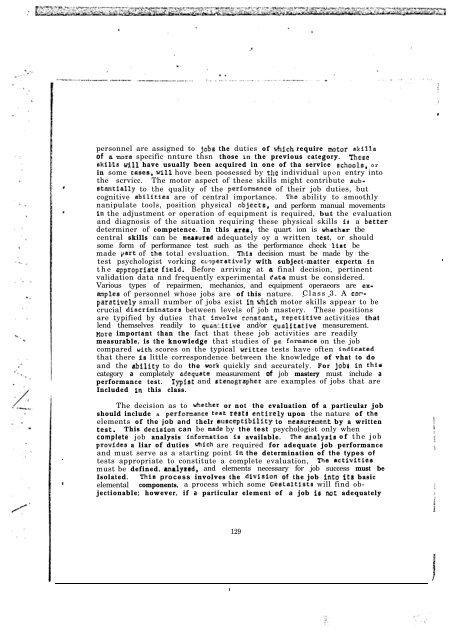Technical Report - International Military Testing Association
Technical Report - International Military Testing Association
Technical Report - International Military Testing Association
You also want an ePaper? Increase the reach of your titles
YUMPU automatically turns print PDFs into web optimized ePapers that Google loves.
.<br />
personnel are assigned to jobe the duties of k%lch require rotor nkil.ls<br />
of 8 mre specific nnture thsn those in the previous category. ThCQC<br />
skilile till have usually been acquired in one of tha service achoola, or<br />
in some casea, will hove been poosesscd by the individual upon entry into<br />
the scrvicc. The motor aspect of these skills might contribute oubstantially<br />
to the quality of the performence of their job duties, but<br />
cognitive abilities are of central importance. The ability to smoothly<br />
nanipulate tools, position physical objects, and perform manual movements<br />
in the adjustment or operation of equipment is required, but the evaluation<br />
and diagnosis of the situation requiring these physical skills le a better<br />
determiner of competence. In this erea, the quart ion is vhether tbe<br />
central skills can be musurad adequately oy a written test, or should<br />
some form of performance test such as the performance check list be<br />
made part of :ho total evsluation. This decision must be made by the<br />
test psychologist vorking cooperatively with subject-matter expcrtn in<br />
the epproprlate field. Before arriving at 8 final decision, pertinent<br />
validation data nnd frequently experimental c’cita must be considered.<br />
Various types of repairmen, mechanics, and equipment operaeors are exsmples<br />
of personnel whose jobs are of this nature. -Class -3.<br />
A COFparntlvely<br />
small number of jobs exist in !&ich motor skills appear to be<br />
crucial discriminators between levels of job mastery. These positions<br />
are typified by duties that involve const.ant, rcpctitivc activities that<br />
lend themselves readily to qt;an::itlve and/or quolitatlve measurement.<br />
Horc important than the fact that these job activities are readily<br />
measurable, is the knowledge that studies of pc. formance on the job<br />
compared with scores on the typical wrftten tests have often indicated<br />
that there is little correspondence between the knowledge of vhat to do<br />
and the ability to do the wrk quickly snd accurately. For joba in this<br />
category a completely adequste measurement of job mastery must include a<br />
performance test. Typist and sterographcr are examples of jobs that are<br />
Included in this class.<br />
The decision as to bbether or not the evaluation of a particular job<br />
should include a performace tcet rent6 entirely upon the nature of the<br />
elements of the job and thelr susceptibl~lty to meaaureneet by a written<br />
test. This declslon can be made by the test psychologist only when<br />
complete job analysis lnfornatioa fa available. ‘I’he analysie of the job<br />
provide8 a liar of duties &ich are required for adequate job performance<br />
and must serve as a starting point in the determination of the types of<br />
tests appropriate to constitute a complete evaluation, The actlvftiee<br />
must be defined, analyaed, and elements necessary for job success must be<br />
Isolated. This process involves the dlvialon of the job into its basic<br />
elemental components, a process which some Cestaltisee will find objectionable;<br />
however, if a particular element of a job fs not adequately<br />
,<br />
129<br />
.<br />
.









